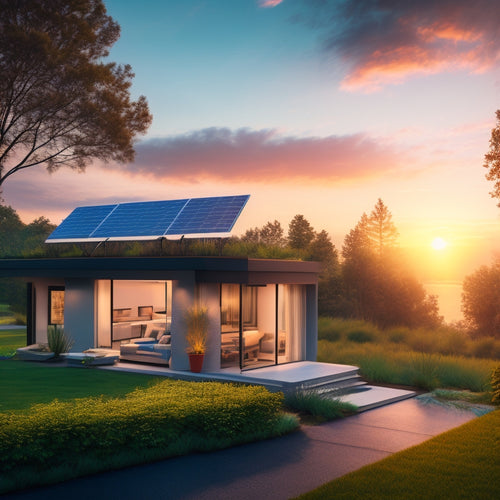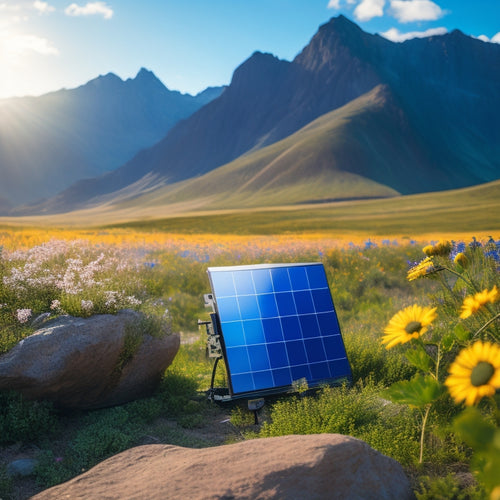
Why Home Energy Storage Matters Now
Share
By investing in a home energy storage system, you'll save up to 50% on your energy bills while reducing your carbon footprint and dependence on the grid. You'll lower peak demand charges by shifting energy usage to off-peak hours, and participate in demand response programs to optimize energy usage patterns. Additionally, home energy storage enables control over energy consumption, allowing excess energy from solar panels or wind turbines to be stored for use during peak hours. With the ability to provide backup power during outages and reduce energy waste, you'll want to investigate how to maximize the benefits of your system, revealing its full potential.
At a Glance
- Home energy storage optimizes energy consumption, reducing peak demand and energy waste, leading to significant financial savings and a lower carbon footprint.
- By storing excess energy from renewable sources, homeowners can minimize reliance on the grid and achieve energy independence, enhancing energy resilience.
- Effective energy management strategies enabled by home energy storage reduce carbon emissions, contributing to a cleaner environment and a sustainable future.
- With backup power during outages, home energy storage ensures essential appliances remain operational, providing peace of mind and protecting against food spoilage and energy waste.
- Advancements in battery technology and lifespan make home energy storage a viable, long-term solution for homeowners seeking to reduce their reliance on the grid and fossil fuels.
Save Money on Bills
By installing a home energy storage system, you'll lower your peak demand charges by shifting your energy usage to off-peak hours.
This reduction in peak demand will lead to significant savings on your energy bills.
With a reliable source of backup power during outages, you can avoid spoiled food and reduce energy waste by storing excess energy generated by your solar panels or wind turbines, further decreasing your reliance on the grid.
Lower Peak Demand
You can markedly reduce your energy bills by optimizing your home's energy usage patterns, particularly during peak hours when utility companies charge higher rates.
This is where home energy storage comes in, enabling you to take control of your energy consumption and lower your peak demand. By storing excess energy generated by your solar panels or wind turbines during off-peak hours, you can use it to power your home during peak hours, reducing your reliance on the grid and avoiding higher rates.
With a battery storage system, you'll gain protection from grid outages and fluctuations, and have more control over your energy bills. This approach also enhances your energy resilience by providing a buffer against grid outages and rate fluctuations.
By participating in demand response programs, you can further reduce your energy bills by adjusting your energy usage in response to changes in grid demand. Home energy storage allows you to make the most of these programs, ensuring you're always getting the best rate possible.
Reduce Energy Waste
Optimizing your energy usage patterns not only helps you lower your peak demand but also reduces energy waste, a significant contributor to higher energy bills. By implementing effective energy management strategies, you can identify and eliminate unnecessary energy consumption. This translates to direct savings on your energy bills, giving you more control over your energy expenses.
With the ability to store excess energy generated by solar panels or other renewable sources, grid scale storage can also help reduce reliance on the grid, minimizing the environmental impact of traditional power consumption. Home energy storage systems play an essential role in waste reduction by allowing you to store excess energy generated during the day for later use. This approach guarantees that you're not wasting energy that's already been generated.
Furthermore, energy storage systems enable you to optimize your energy usage patterns, shifting non-essential loads to off-peak hours when energy rates are lower. By reducing energy waste, you're not only saving money but also minimizing your carbon footprint.
With home energy storage, you're in charge of your energy management, making conscious decisions about when and how you use energy. By taking control of your energy usage, you're taking a significant step towards energy independence.
Reduced Carbon Footprint Guaranteed
By investing in home energy storage, you're not only saving money on bills, but you're also contributing to a cleaner environment.
With integrated solar panel energy storage solutions off grid solar systems, you can maximize your renewable energy savings and reduce your reliance on fossil fuels.
You'll be tapping into cleaner energy sources, reducing your reliance on fossil fuels and lowering your carbon emissions.
With home energy storage, you can rest assured that you're doing your part to minimize your ecological impact today.
Cleaner Energy Sources
Cleaner energy sources are becoming increasingly vital as the world shifts towards a more sustainable future.
As you move towards renewable energy, you're not only reducing your carbon footprint but also contributing to a cleaner environment.
Renewable integration is essential in this process, allowing you to utilize the power of solar and wind energy.
With home energy storage, you can store excess energy generated by these sources and use it when needed, ensuring a reliable and efficient supply.
Lower Emissions Today
As you employ the power of renewable energy sources, you're not only generating clean electricity but also greatly reducing your reliance on fossil fuels. This change towards renewable energy is essential in the fight against climate change, and home energy storage plays a critical role in making it a reality.
By storing excess energy generated by your solar panels or wind turbines, you can guarantee a steady supply of clean power even when the sun isn't shining or the wind isn't blowing.
With home energy storage, you can greatly reduce your carbon footprint and lower emissions today. This is especially important as the world shifts towards a more sustainable future.
Renewable integration is key to achieving this goal, and home energy storage enables you to maximize the benefits of renewable energy sources. Furthermore, it enhances grid resilience by providing a buffer against power outages and grid instability.
Deep Cycle Battery Benefits
You'll experience increased energy independence with deep cycle batteries, as they allow you to store excess energy generated by your solar panels or wind turbines, reducing your reliance on the grid.
This, in turn, provides you with a sense of security and control over your energy usage. With reliable energy storage, you can enjoy consistent power supply in remote areas, making off grid solar power a reality.
Additionally, deep cycle batteries are designed to last longer, with a lifespan of up to 15 years or more, depending on the type and quality of the battery.
Increased Energy Independence
Freedom from reliance on the grid is a fundamental aspect of home energy storage, and deep cycle batteries play an essential role in achieving this independence.
With a deep cycle battery system, you'll have the power to generate and store your own energy, reducing your reliance on the grid and increasing your energy security. This means you'll be less affected by power outages, rate hikes, and grid instability.
You'll enjoy the peace of mind that comes with self-sufficiency, knowing you can power your essential appliances and devices even when the grid goes down.
Deep cycle batteries provide a reliable source of backup power, ensuring your lights stay on, your fridge stays cold, and your communication devices stay connected.
Longer Battery Lifespan
Frequently, homeowners who invest in deep cycle battery systems reap the benefit of a longer battery lifespan. This means you can enjoy the advantages of home energy storage for an extended period, reducing the need for frequent replacements and resulting in significant cost savings. The latest advancements in battery technology have led to the development of high-performance batteries with improved energy efficiency.
| Battery Type | Lifespan |
|---|---|
| Lead-Acid | 5-7 years |
| Lithium-Ion | 10-15 years |
| Flow Battery | 20-30 years |
With a longer battery lifespan, you can store excess energy generated by your solar panels or wind turbines during the day and use it at night or during power outages, reducing your reliance on the grid. This increased energy independence provides you with the freedom to manage your energy usage according to your needs. By investing in a high-quality deep cycle battery system, you can enjoy a longer battery lifespan, improved energy efficiency, and significant cost savings in the long run.
Check Your Inverter Compatibility
When selecting an inverter for your home energy storage system, you'll need to verify it's compatible with your setup.
As you investigate solar energy solutions, consider how renewable energy systems can optimize your energy storage goals.
The type of inverter you choose matters, as it affects the system's overall performance and efficiency.
You'll want to check your system configuration to confirm a seamless integration with the inverter, avoiding any potential mismatches that could hinder your energy storage goals.
Inverter Type Matters
Your home energy storage system's inverter type plays a critical role in guaranteeing seamless integration with your existing electrical infrastructure. The inverter is responsible for converting the DC power stored in your batteries to AC power that can be used in your home.
With various inverter technologies available, it's crucial to choose the right one for your system. You'll want to evaluate inverter efficiency, as it directly impacts the overall performance of your energy storage system. A high-efficiency inverter can maximize the amount of usable energy stored in your batteries, reducing energy waste and saving you money.
Look for inverters with high peak efficiency ratings and low standby power consumption. Some inverter types, like string inverters, are better suited for grid-tied systems, while others, like microinverters, are ideal for off-grid or hybrid configurations.
Verify the inverter you select is compatible with your energy storage system's design and your specific energy needs. By choosing the right inverter type, you'll be able to unleash the full potential of your home energy storage system and enjoy the freedom and flexibility you desire.
System Configuration Checks
As you've selected the right inverter type, it's now essential to ascertain your inverter is compatible with your system's configuration. This guarantees peak system performance and avoids potential issues down the line. You'll need to verify that your inverter can handle the maximum power output of your solar panels or energy generators.
Check your inverter's installation guidelines to verify it can accommodate your system's voltage, current, and frequency requirements. You should also confirm that your inverter is compatible with your battery type and capacity.
Failure to do so may result in reduced system performance, premature component failure, or even complete system failure.
It's also vital to verify that your inverter is certified for your region's grid requirements. This guarantees safe and efficient operation when feeding excess energy back into the grid.
Longer Backup Power Duration
You'll want to guarantee your home energy storage system provides extended power outage protection, especially if you live in an area prone to frequent or prolonged outages.
A longer backup power duration gives you peace of mind, keeping your essential appliances running until the grid is restored.
Extended Power Outage Protection
Three days without power can be a challenging experience, especially when it means no refrigeration, lighting, or communication. With extended power outage protection, you can guarantee your home remains powered even when the grid fails. This is critical for emergency preparedness and grid resilience.
| Duration | Backup Power Needs | Energy Storage Capacity |
|---|---|---|
| 8 hours | Basic appliances (lights, fridge) | 5-10 kWh |
| 12 hours | Moderate appliances (add washer, dryer) | 10-15 kWh |
| 24 hours | Extended appliances (add HVAC, water pump) | 15-20 kWh |
| 48 hours | Whole-home backup | 20-30 kWh |
| 72 hours | Whole-home backup with electric vehicle charging | 30-40 kWh |
Frequently Asked Questions
Can I Use a Home Energy Storage System With My Existing Solar Panels?
You can definitely use a home energy storage system with your existing solar panels, ensuring solar panel compatibility and unblocking energy storage benefits, like reduced grid reliance and increased energy independence, giving you more control over your power.
How Long Does It Take to Install a Home Energy Storage System?
You're enthusiastic to utilize your solar power, but first, you wonder how long the installation process will hold you back. Typically, it takes 1-3 days to install a home energy storage system, depending on the complexity of system components and your installation timeline.
Are Home Energy Storage Systems Prone to Overheating or Fire Risks?
You're right to wonder: are home energy storage systems prone to overheating or fire risks? Fortunately, manufacturers prioritize battery safety through advanced thermal management and fire prevention strategies, conducting rigorous risk assessments to guarantee safe, reliable operation.
Can I Monitor My Home Energy Storage System Remotely?
You can conveniently monitor your home energy storage system remotely, leveraging advanced energy management capabilities to track performance, receive alerts, and optimize energy usage, granting you freedom and control over your energy independence.
Are There Any Government Incentives for Installing Home Energy Storage Systems?
You're steering through the home energy storage terrain like a captain charting new waters. You'll find federal rebates and state incentives waiting like hidden treasures, offering significant savings on your installation costs, giving you the freedom to utilize your energy independence.
Explore More
As you weigh the benefits of home energy storage, remember that it's a triple threat: saving you money on bills, shrinking your carbon footprint, and providing reliable backup power when the grid goes dark. Like a shield against rising energy costs and unpredictable outages, home energy storage has got your back - and your wallet. By investing in this technology, you're not just future-proofing your home, you're illuminating a path to a more sustainable tomorrow.
Related Posts
-

The Future of Residential Energy Storage
The future of residential energy storage looks promising and cost-effective for you. With lithium-ion battery prices ...
-

High-Efficiency Solar Battery Chargers for Remote Areas
High-efficiency solar battery chargers are essential for your off-grid energy needs in remote areas. They maximize en...
-

Top Solar Powered Camping Fans for Camping Enthusiasts
If you're a camping enthusiast, a solar-powered fan can be a transformative element for your outdoor experience. Thes...


